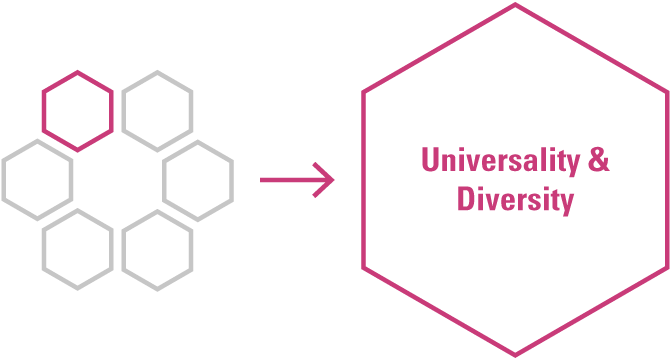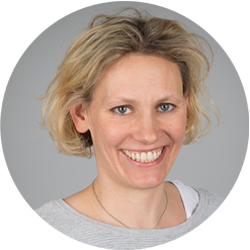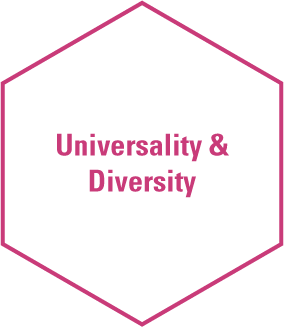- GU Home
- Research at Goethe University
- Profile Area Universality & Diversity

Mission Statement

Read more
The research focus "Dynamics of Religion: Processes of Comprehension, Misapprehension, and Mutual Understanding" exemplifies the cooperation and discussion between the disciplines within this Profile Area. It brings Christian theologies, religious studies, Jewish studies and Islamic studies together with history, philosophy, ethnology, or archaeology. By means of interdisciplinary and interreligious explorations, the focus lies on researching in both historical and contemporary global contexts the mutual relations and perceptions – dialogical or conflictual – between the three inherently diverse religions "Judaism", "Christianity" and "Islam" (and between them and the increasingly secular constellations of modern and contemporary plural societies). Key to this question and in this context are the complex processes of "comprehension," "misapprehension," and "mutual understanding". The participants' research perspectives are connected, among others, by a common interest in (1) the conceptual and historical research of the dialogical and conflictual aspects of mutual processes of understanding between religious traditions; (2) the phenomena of understanding one's own religion and the religious other in multi-religious and secular contexts, (3) the relationship between intra-religious and inter-religious plurality, (4) the attribution of cultural identities to the self and to others in the area of cult and ritual, (5) the socio-cultural dynamics and economic contexts of the encounter between ethnic and religious groups, (6) the interreligious dynamics of cultural transfer, translation, appropriation, and transformation of religious-cultural knowledge orders, (7) phenomena of destructive or creative misunderstandings, and (8) the rational, emotional, and political-social conditions of the possibility for religious dialogues and understanding, or (9) the transformation of religious, cultural, and social discourses through the increasing digitality of both research and public communication. The idea behind establishing a "Competence Center Religion" is to systematically develop the potentials of the participating disciplines in the fields of science communication, transfer and science policy.
The Profile Area "Universality and Diversity" aims to strengthen the existing networks between the research carried out by different disciplines, joint projects and centers, as well as between individual Goethe University projects that deal with the above-mentioned research topics through joint forms of working and discussion forums, thereby profiling the different disciplinary approaches on historical questions and current debates in the fields of society and culture, and simultaneously exploiting their mutual synergies. At the same time, the Profile Area intends to cooperate closely with the "Orders & Transformations" Profile Area, whose research perspectives are greatly important to the topics of diversity and universality. The approaches of religious studies, history, cultural studies, linguistics, and literature in turn offer important cooperation possibilities for the social sciences. Likewise, a dialogue with the Profile Area "Sustainability & Biodiversity" will set out to find how cultural and biological diversity relate to one another, and how diversity research in the humanities and the natural sciences can learn from each other. Key to the Profile Area's work are joint strategies for the internationalization of research and teaching, the systematic promotion of early career researchers, and further strengthening the city of Frankfurt as a center of science through the acquisition of third-party funded projects.

Profile Area Spokespersons

What fascinates and motivates me about the Profile Area's research perspectives is the polyphony of thematic accesses and methodological approaches that play a role in it. Whether independently or as part of a critical dialogue across disciplinary boundaries, in their questioning about the relationship between universality and diversity, the disciplines involved embody a decisive characteristic of excellent research at Goethe University: relevance to contemporary challenges, historical depth of focus, and a differentiated theoretical toolkit.
Spokesperson of the Universality & Diversity Profile Area

As a linguist, I feel naturally at home in the area of tension between diversity and universality. For despite all linguistic diversity, the fascinating linguistic variation we observe both historically and across the world's languages is not arbitrary but systematically constrained by universals. Against this background, I would like to play an active role in shaping the exchange between our Profile Area's many different disciplines and, by engaging in conversations about the different views on diversity and universality, help develop a common research perspective for our Profile Area.
Cornelia Ebert (Linguistics),
Spokesperson of the Universality & Diversity Profile Area

Key Research Areas

Against this background, the Profile Area "Universality and Diversity: Linguistic, Religious, and Cultural Dynamics" bundles the relevant competencies of the aforementioned disciplines at Goethe University and, using methods and approaches from the humanities, provides answers to these pressing contemporary challenges with the necessary historical depth.
Dynamics of the Religious
Multilingual Agency
This key research area is concerned with current global challenges and crises, among others, through worldwide migration movements of people, languages and cultures. It deals with challenges that regionally oriented research is increasingly facing as a result of globalization dynamics and transregionalization processes. This can be exemplified by the LOEWE priority area "Minority Studies - Language and Identity". It examines the interactions of factors that determine identity, such as language, religion, culture and ethnicity, from the point of view of the self and of others, both "in one's own country" and "abroad".
This is closely related to the phenomenon of moving cultures, multilingual societies and hybrid language practices. Multilingualism has an impact on different levels. Research in this area can be devoted to individual requirements, but also investigate dimensions of societal heterogeneity up to global communication. Many of these processes and mechanisms are phenomena of so-called translanguaging: Here, the linguistic repertoire of individuals is no longer understood as a mosaic of different individual languages, but as a complex overall linguistic repertoire. In addition, written practice and oral communication, especially in the fields of new media and digital communication, have to be analyzed in connection. Multilateral multilingualism and multimodality require new ways of description, interpretation and representation. The key research area "Multilingual Agency" wants to contribute to this in an innovative way.
The Blueprint of the Human Language Faculty
Three essential insights of modern linguistic theory constitute the starting point of our research program: first, linguistic expressions are organized hierarchically, although superficially, linguistic signals consist of a linear concatenation of sounds, words and sentences. Second, linguistic variation, both diachronically and across typologically different languages, is not random but restricted in systematic ways. The blueprint of the human language faculty therefore determines the commonalities among languages and, moreover, the range of linguistic variation and its limits. Third, the human language faculty is organized in a modular fashion, comprising the core modules of language, phonology, morphology, syntax, semantics and pragmatics. To arrive at a coherent model of the grammatical architecture underlying the human language faculty, specific research questions need to be addressed, using research methods tailored to the particular module under investigation.
Accordingly, we investigate the relation between the variable and invariable principles of language to answer central research questions that form the common basis of the linguistic research carried out at Goethe University.
- In which way does the blueprint of the human language faculty determine the acquisition of one or more specific first languages?
- How can the typological heterogeneity of the languages of the world be captured within a general blueprint of human language?
- To what extent are the different modules of the human language organized in a parallel fashion?
- Does the diachronic variation between different stages of the same language mirror the same general principles as synchronic variation between genetically close and distant languages?
- How does linguistic knowledge interact with other cognitive systems in production and comprehension?

Coordinated Research Projects
DFG (German Research Foundation)
- CRC 1629 "NegLaB - Negation in language and beyond"
- RTG 2016 "Nominal Modification"
- RTG 2279 "Configurations of Film"
- FOR 5173 "RISS - Reconfiguration and Internalization of Social Structure"
- Kolleg-FOR 2932 "POLY - Polycentrism and Plurality of Premodern Christianities"
- SPP 2392 "ViCom - Visual Communication: Theoretical, Empirical, and Applied Perspectives"
HMWK (Hessian Ministry of Higher Education, Research, Science and the Arts)
- LOEWE Priority "Minority Studies: Language and Identity"
Association
- LOEWE Priority "AO - Architectures of Order. Practices and Discourses between Design and Knowledge" (TU Darmstadt)
BMBF (Federal Ministry of Education and Research)
- "AIWG – Academy for Islam in Research and Society"
- "CEDITRAA – Cultural Entrepreneurship and Digital Transformation in Africa and Asia"
- "QuaMaFA – Qualification and Skill in the Migration Process of Foreign Workers in Asia"
- "LemaS Transfer – Promoting Excellence in School Education"
- "DigiNICs – Digitally-based Networked Improvement Communities to strengthen digital sovereignty in the subjects of language education" (German link only)
Association
- FGZ – Research Institute for Social Cohesion (Forschungsinstitut Gesellschaftlicher Zusammenhalt)
Others
- "Buber Correspondences digital" (Academy Project, Christian Wiese, FB 06)
- "The School of Salamanca. A Digital Collection of Sources and a Dictionary of its Juridical-Political Language" (Academy Project Matthias Lutz-Bachmann, FB 08)
- "Synagogen-Gedenkbuch Hessen" ("Hesse Synagogue Memorial Book Project"; German link only)
- "AGE-C: Ageing and Gender in European Cinema" (VolkswagenStiftung)
- "Representing the 'Other': Museums, Universities, Ethnology" (Doctoral Program of Deutsch-Französische Hochschule; German link only)
- "Broken Traditions? Jewish Literature, Philosophy and Music in Nazi Germany" (Doctoral Program of Hans Böckler Foundation)
Distinguished individual Researchers
ERC Grants
- Starting Grant "NoJoke - Humor as an epistemic practice of the political present" (Mirco Göpfert, FB 08)
- Starting Grant "ChiParNet - The Interplay of Children's and Parents' Networks in Shaping Each Other's Social Worlds" (Lars Leszczensky, FB 03)
Emmy Noether Junior Research Group
- "Linking Ages - The Material-Discursive Practices of Un/Doing Age across the Life Course" (Anna Wanka, FB 04)
Heisenberg-Programme
- Professorship "Touching Spaces - Subject Formation and Collective Processes in the Art of the 1960s and 1970s" (Antje Krause-Wahl, FB 09)
Leibniz Prizes
- 2015, Hartmut Leppin (FB 08)
- 2007, Bernhard Jussen (FB 08)
Institutions involved
GRADE-Centers
- GRADE Aging
- GRADE Education
- GRADE Gender
- GRADE GPE – History, Philosophy, Anthropology
- GRADE Language
- GRADE PPD Humanities
- GRADE RuTh - Religious Studies and Theology
- GRADE Social Sciences
Institutions of Goethe University
- CGC - Cornelia Goethe Center for Women's and Gender Studies
- FzHG - Frankfurt Humanities Research Centre
- IRF - Institute for Philosophy of Religion (German link only)
- IZO - Interdisciplinary Center for East Asian Studies
- ZIAF - Center for Interdisciplinary African Studies
- ZEFIS - Center for Islamic Studies (German link only)
Cooperating Institutions
- Frobenius-Institut for Research in Cultural Anthropology
- BRI - Buber-Rosenzweig-Institute for Modern and Contemporary Jewish Intellectual and Cultural History (German link only)
- Frankfurt-Tel Aviv Center for the Study of Religious and Interreligious Dynamics
- FKH - Forschungskolleg Humanwissenschaften (Institute for Advanced Studies in the Humanities)
Institutes of Non-University Partners
- FBI - Fritz Bauer Institute
- DIPF - Leibniz Institute for Research and Information in Education
- MPI AE - Max Planck Institute for Empirical Aesthetics
- MPI LHLT - Max Planck Institute for Legal History and Legal Theory
- IGAIW - Institute for the History of Arabic-Islamic Sciences (German link only)
- ISOE - Institute for Social-Ecological Research
- IFRA - Institut Franco-Allemand de Sciences Historiques et Sociales (French site)
- Studying at Goethe University
- International applicants
- Faculties
- Overview of study programmes
- Programme for refugees
- GRADE
- Goethe Business School (continuing education)
- Research at Goethe University
- Scientific news
- Goethe Welcome Center (for international researchers)
- Collaborative research projects
- Individual research
- Visiting fellowships
- Endowed chairs
- About the University
- News-in-brief
- University administration
- Campus locations
- Campus life
- University archives (German)
- Rhine-Main-Universities











